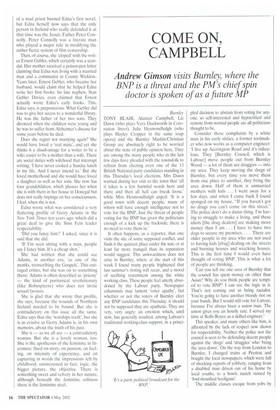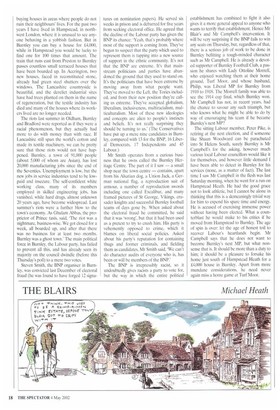COME ON, CAMPBELL
Andrew Gimson visits Burnley, where the BNP is a threat and the PM's chief spin
doctor is spoken of as a future MP
Burnley TONY BLAIR. Alastair Campbell, Liz Dawn (who plays Vera Duckworth in Coronation Street), Julie Hesmondhalgh (who plays Hayley Cropper in the same soap opera) and the Burnley Muslim/Christian Group are absolutely right to be worried about the state of public opinion here. They are among the many people who in the last few days have pleaded with the townsfolk to refrain from electing even one of the 13 British National party candidates standing in this Thursday's local elections. Mrs Dawn warned during her visit to the town that 'all it takes is a few harmful words here and there and then all hell can break loose,' while Miss Hesmondhalgh urged: It is a good town with decent people, many of whom will have enough intelligence not to vote for the BNP. Just the threat of people voting for the BNP has given the politicians enough of a kick up the backside; there is no need to vote them in.'
It often happens, as a reporter, that one visits the site of some supposed conflict, and finds it the quietest place under the sun, or at least far more tranquil than its reputation would suggest. This awkwardness does not arise in Burnley, where at the start of this week I found many people frightened that last summer's rioting will recur, and a mood of seething resentment among the white working class. These people feel utterly abandoned by the Labour party. Newspaper columnists may lament 'voter apathy', but whether or not the voters of Burnley elect any BNP candidates this Thursday, it should not be supposed they are apathetic. They are very, very angry: an emotion which, until now, has generally resulted, among Labour's traditional working-class support, in a princi pled decision to abstain from voting for anyone, so self-interested and hypocritical and remote from normal people are all politicians thought to be.
Consider these complaints by a white man in his early sixties, a former toolmaker who now works as a computer engineer: 'I live up Accrington Road and it's ridiculous. They [Burnley Council, which is Labour] move people out from Burnley Wood — a lot of them are druggies — into my area. They keep moving the dregs of Burnley, but every time you move them from one place to another, they bring the area down. Half of them is unmarried mothers with kids ... I went away for a few days, and when I came back I found sponged on my house, "If you haven't got no drugs you can't come on this street." The police don't do a damn thing. I'm having to struggle to make a living, and these idiots [the drug dealers] are making more money than I am . . I have to have two dogs to secure my premises. . . There are older people in my area who are not used to having kids [drug] dealing on the streets and burning houses and wrecking houses. This is the first time I would even have thought of voting BNP. This is what a lot of people are thinking.
'Can you tell me one area of Burnley that the council has spent money on other than Asian? Why do you think people are tempted to vote BNP? I can see the logic in it. That's not coming out as being racialist. You're going to have another bloody riot on your hands. But I would still vote for Labour, because I've always been a union man. The union gives you an hourly rate. I served my time at Rolls-Royce as a skilled engineer.'
This speaker, and many others like him, is affronted by the lack of respect now shown for respectability. Neither the police nor the council is seen to be defending decent people against the 'dregs' and `druggies' who 'bring the area down'. On the way from London to Burnley, I changed trains at Preston and bought the local newspapers, which were full of shocking reports of yobbery, ranging from a disabled man driven out of his home by local youths, to a bowls match ruined by 'foul-mouthed hooligans'.
The middle classes escape from yobs by buying houses in areas where people do not ruin their neighbours' lives. For the past two years I have lived in Hampstead, in northwest London, where it is unusual to see anyone behaving in a yobbish fashion. But in Burnley you can buy a house for E4,000, while in Hampstead you would be lucky to find one for 100 times that amount. The train that runs east from Preston to Burnley passes countless small terraced houses that have been boarded up. In Accrington, two new houses, faced in reconstituted stone, already had green steel shutters over the windows. The Lancashire countryside is beautiful, and the derelict industrial sites have had trees planted on them in the name of regeneration, but the textile industry has died and many of the houses where its workers lived are no longer needed.
The riots last summer in Oldham, Burnley and Bradford were reported as if they were a racial phenomenon, but they actually had more to do with money than with race. If Lancashire still spun the world's cotton and made its textile machinery, we can be pretty sure that those riots would not have happened. Burnley, a town of 91,000 people (about 5.000 of whom are Asian), has lost 20,000 manufacturing jobs since the end of the Seventies. Unemployment is low, but the new jobs in service industries tend to be lowpaid and insecure. The self-confident white working class, many of its members employed in skilled engineering jobs, has vanished, while hard drugs. almost unknown 20 years ago, have become widespread. Last summer's riots were a further blow to the town's economy. As Ghulam Abbas, the proprietor of Prince taxis. said, 'The riot was a nightmare, business-wise. We got closed for a week, all boarded up, and after that there was no business for at least two months. Burnley was a ghost town.' The main political force in Burnley, the Labour party, has failed to prevent all this, and has already seen its majority on the council dwindle (before this Thursday's poll) to a mere two votes.
Steven Smith, the BNP organiser in Burnley, was convicted last December of electoral fraud (he was found to have forged 12 signa tures on nomination papers). He served six weeks in prison and is debarred for five years from seeking electoral office. He agreed that the decline of the Labour party has given the BNP its chance: 'Yeah, that's probably where most of the support is coming from. They've begun to suspect that the party which used to represent them is tapping into a new source of support in the ethnic community. It's not that the BNP are extreme. It's that mainstream politicians and parties have abandoned the ground that they used to stand on. It's the politicians that have been extreme by moving away from what people want. They've moved to the Left, the Tories included, and from their new position they're calling us extreme. They've accepted globalism, liberalism, inclusiveness, multiracialism, multiculturalism. Most of these new ideologies and concepts are alien to people's instincts and beliefs. It's not really surprising they should be turning to us.' (The Conservatives have put up a mere nine candidates in Burnley, compared with 13 for the BNP, 16 Liberal Democrats, 17 Independents and 45 Labour.) Mr Smith operates from a curious business that he owns called the Burnley Heritage Centre. The part of it I saw — a small shop near the town centre — contains, apart from his Alsatian dog. a Union Jack, a German national flag, a reproduction suit of armour, a number of reproduction swords including one called Excalibur, and many framed pictures of St George, Vikings, crusader knights and successful Burnley football teams of days gone by. When asked about the electoral fraud he committed, he said that it was 'wrong', but that it had been used as a pretext to try to crush him. His party is vehemently opposed to crime, which it blames on liberal social policies. Asked about his party's reputation for containing thugs and former criminals, and fielding them as candidates. Mr Smith said, 'We can't do character audits of everyone who is, has been or will be members of the BNP.'
The BNP is irrepressibly racist, so it undoubtedly gives racists a party to vote for, but the way in which the entire political establishment has combined to fight it also gives it a more general appeal to anyone who wants to terrify that establishment. Hence Mr Blair's and Mr Campbell's intervention. It will be very surprising if the BNP fails to win any seats on Thursday, but, regardless of that, there is a serious job of work to be done in Burnley befitting a tough-minded character such as Mr Campbell. He is already a devoted supporter of Burnley Football Club, a passion he shares with Lady Ottoline Morrell, who enjoyed watching them at their home ground, Turf Moor, and whose husband. Philip, was Liberal MP for Burnley from 1910 to 1918. The Morrell family was able to see the 1914 cup final. which Burnley won. Mr Campbell has not, in recent years, had the chance to savour any such triumph, but who knows what he might be able to do by way of encouraging his team if he became Burnley's next MP?
The sitting Labour member, Peter Pike, is retiring at the next election, and if someone like Shaun Woodward can be parachuted into St Helens South, surely Burnley is Mr Campbell's for the asking, however much various local Labour councillors would like it for themselves, and however little demand I have been able to detect in Burnley for his services (none, as a matter of fact). The last time I saw Mr Campbell in the flesh was last Saturday morning, when he went for a run on Hampstead Heath. He had the good grace not to look athletic. but I cannot be alone in thinking that this is a demeaningly trivial way for him to expend his spare time and energy. He is accused of exercising immense power without having been elected. What a counterblast he would make to his critics if he moved from Hampstead to Burnley. The age of spin is over: let the age of honest toil to recover Labour's heartlands begin. Mr Campbell says that he does not want to become Burnley's next MP, but what nonsense that is. It should be more than a duty to him; it should be a pleasure to forsake his home just south of Hampstead Heath for a £4,000 house in Burnley. Apart from more mundane considerations, he need never again miss a home game at Turf Moor.







































































 Previous page
Previous page